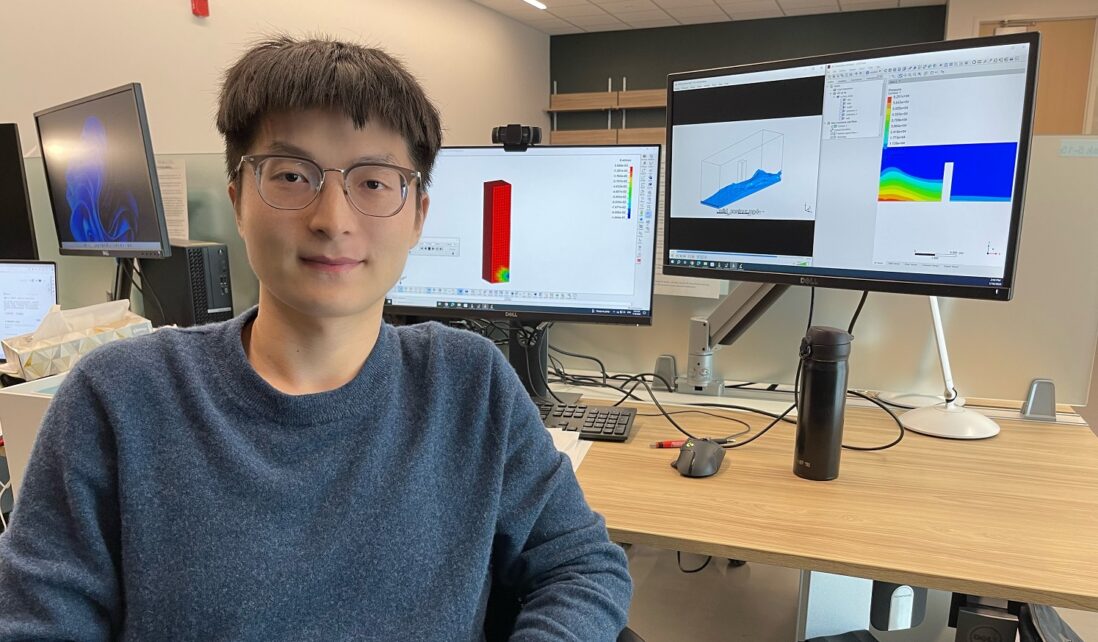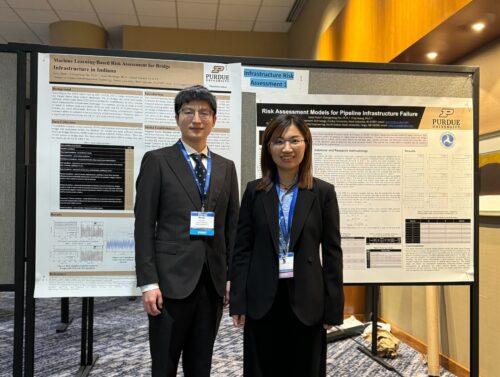
Meet Our Grad Student Scholars is a series from Illinois-Indiana Sea Grant (IISG) celebrating the students and research funded by our scholars program. To learn more about our faculty and graduate student funding opportunities, visit Fellowships & Scholarships.
Junyi Duan is a second-year Ph.D. student in the School of Construction Management Technology at Purdue University. His research interest is employing computer-based technologies to investigate the responses of infrastructure that is vulnerable to natural hazards. He is currently working on an IISG-funded project to efficiently promote infrastructure resilience in the Lake Michigan region.
Due to global climate change, extreme weather events like floods are becoming more frequent. Climate change results in higher Lake Michigan water levels, along with stronger winds and heavier storms, which exacerbates coastal damage. In the last two years, more than 200 coastline communities have spent $878 million repairing damages caused by natural hazards. The spending on repair won’t stop there − it is estimated that shoreline municipalities in the Great Lakes region will spend approximately $2 billion in the near future to restore public infrastructure that has been damaged by recent floods and erosion.
Imagine an old bridge to your house facing relentless storms and floods. You would have some worries, right? Junyi Duan is aiming to understand how different infrastructures handle these disasters. He is tackling the challenge of how to make our coastal communities more resilient to these impacts in the Sustainable Infrastructure and ManUfacturing Lab, supervised by his advisor, Chengcheng Tao, a Purdue University civil engineer and director of the lab.

Duan and Tao are filmed as part of a flood hazard impact video for K-12 education.
Duan is integrating fluid-structure interaction modeling and artificial intelligence (AI) algorithms to decipher how floods affect infrastructures and communities. “It’s like predicting the future, not to predict doom, but to prepare and enhance the safety of our coastal areas,” said Duan.
The first step on his journey was learning from the past. Duan collected historical records to reveal how floods impacted various places around southern Lake Michigan. This information acted as a guide, steering him toward creating new models. This virtual testing helped him to understand the potential impact of floods and storms on coastlines.
The next step involved creating a powerful two-stage model. First, a physical model combining computational fluid dynamics analysis and finite element analysis was used to assess the flood impact on infrastructure as well as the structural response, respectively. This step helped Duan understand how natural hazards impact infrastructure. Preliminary work involved simulating the effects of floods on bridge infrastructure, which provided valuable insights into structural weakness.

Duan presents his research at the ASCE INSPIRE conference with his advisor Tao.
In the second stage, Duan introduced artificial intelligence and machine learning algorithms. “These algorithms are the secret sauce, crunching big data from the physical model and historical records,” he said.
The result is a comprehensive data-driven model that not only simulates potential flooding damage but also predicts the risk tendencies of critical infrastructural components. The model goes beyond simulations, offering suggestions to reinforce infrastructure, resist floods, and mitigate impacts on southern Lake Michigan coastal communities.
“This stage is crucial for stakeholders looking to make informed decisions about infrastructure types and designs suitable for the coastal area,” said Duan.
You might be wondering, why should this research matter to you. “Imagine living in a coastal community knowing that your home, your school, and your favorite spots are better prepared to face whatever nature throws your way,” said Duan. “Understanding potential hazards and reinforcing infrastructure isn’t just about avoiding damage; it’s about creating a safer, more resilient environment for everyone.”
The outcomes of this study have been presented at three American Society of Civil Engineers (ASCE) conferences and published as five conference papers. In addition, Duan and Tao worked with Purdue Science K-12 Outreach and filmed an educational video about flood hazards that will be posted on YouTube as part of Purdue’s Superheroes of Science series.
“Over the past two years, I have collaborated on research focused on the Great Lakes area, an ecosystem that sustains over 100 million people and harbors approximately 3,500 species of plants and animals. I admit that I cannot stop global warming or alleviate extreme weather events,” Duan said. “However, my aspiration is that the findings from our research will benefit shoreline residents and municipalities, contributing to the mitigation of economic, physical and ecological losses.”
As Duan charts the course through this research journey, he is not just contributing to scientific knowledge. He aims to pave the way for a safer tomorrow.
Illinois-Indiana Sea Grant is a partnership between NOAA, University of Illinois Extension, and Purdue University Forestry and Natural Resources, bringing science together with communities for solutions that work. Sea Grant is a network of 34 science, education and outreach programs located in every coastal and Great Lakes state, Lake Champlain, Puerto Rico and Guam.

